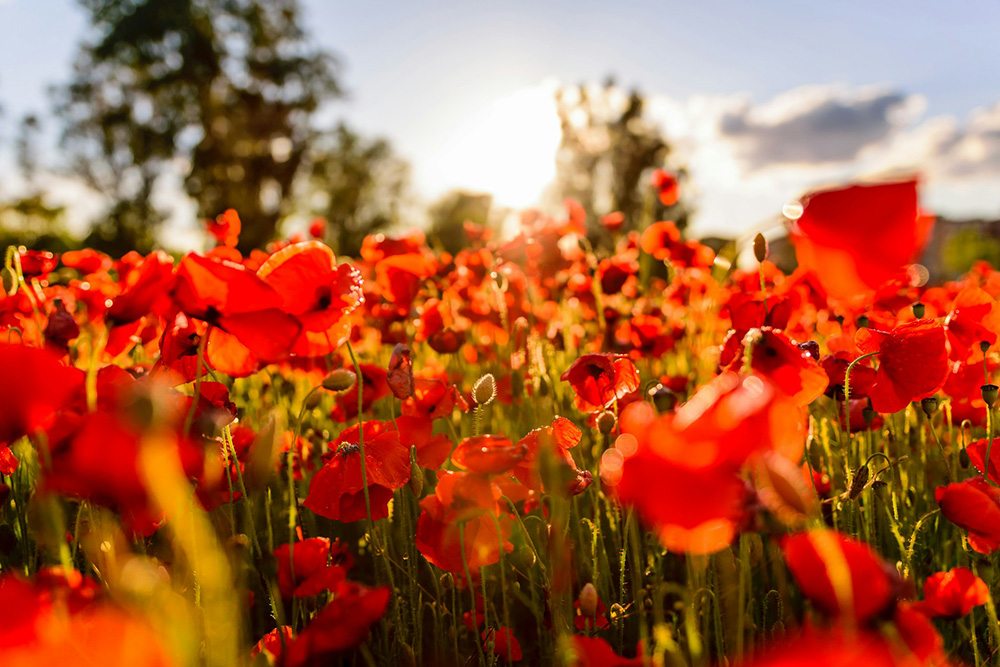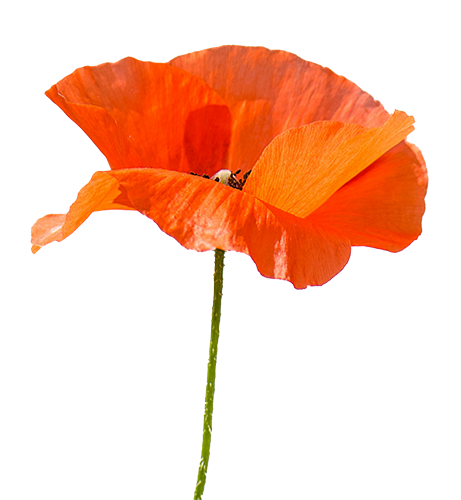Remembrance Sunday – Lest we forget
We believe that Remembrance Day is an extremely important day in the yearly calendar. We consider it something that should be a priority for young and old alike forevermore – and not just on Remembrance Sunday. It is a time to remember the sacrifice that so many made so that others could be free.
They shall grow not old, as we that are left grow old:
Age shall not weary them, nor the years condemn.
At the going down of the sun and in the morning
We will remember them.
(From ‘For the Fallen’ written by Laurence Binyon)

Remembrance Sunday: Why the symbol of the red poppy was chosen
‘The poppy is the enduring symbol of remembrance of the First World War. It is strongly linked with Armistice Day (11 November), but the poppy’s origin as a popular symbol of remembrance lies in the landscapes of the First World War. Poppies were a common sight, especially on the Western Front.’ (Source: Why We Wear Poppies on Remembrance Day)
As time inevitably marches forward in our universe, second by second, and the great wars fade into ever more distant memories, it can become easier to forget how difficult times in the past have been for different generations. On top of that, in our world today, all the technological advancements and distractions of life are drawing our attention away from spending time in remembrance and reflection.
Remembering to take time out to remember
We believe that specifically pausing and taking time out to remember – even if you are not a religious person – to reflect on the terrible tragedy of wars, is something that should never cease and something that everyone, wherever possible, should always continue to actively participate in. Taking time out to reflect on some of the most darkest hours to ever descend across this earth may also help to bring things into perspective in your own personal life and encourage you to seek a positive and encouraging way forward. No-one is immune from the results of the actions of others, but how you react to something is just as important even if it is not always simple or easy.
Remembrance Sunday: The sad, sad reality of today – real history and time lost
The loss of real-life testimony from the lips of those who were actually there living through the world wars, like the Gospel message which was originally recorded with first-hand accounts of the events that took place, can make it much easier for us understand. If we understand everything as a historical story or record of the facts rather than something that was a truly unimaginably horrific reality for those who were there and lived through it, then it perhaps becomes much easier to dismiss it and put it to the back of our minds.
In reality, and so, so desperately sadly, at any point across the world similar horrific things are still happening in some way today, and it is no less horrific wherever it is taking place. In addition, there is the ever constant threat of new wars. These are all reasons why we should never forget.
Learning and changing as a result of past wars
There is a very sad reality that despite the remembrance of world wars and wars from the past, nothing has truely yet changed in this world – the same greedy, malicious, desire to be idolised, search for power, slander, self-righteousness hasn’t changed in the pursuit of local or global gain, control and rule. The necessity to defend in war from an aggressor remains, and will always remain all the time there is an aggressor. This is a critically difficult issue with no easy answer – all wars involve an aggressor and a defender. Ever since the fall – where sin entered our world – as recorded in Genesis, humankind has engaged in conflict and disagreement of some sort throughout pre-history and all known history.
The Bible includes a record of times of war and battles particularly in the Old Testament, known as the ‘Old Covenant’. Whether the aggressor or defender, we cannot shy away from that record of history and the time since, where many more terrible wars, crusades and other conflicts occurred. Lest we forget these. In this world, we cannot go back to change history, but we all can work together to change the course of the future. Pray regualarly for anyone in leadership from your local teachers to global leaders.
The amazing good news is that the New Testament brings a whole new positive perspective and focus through Jesus. It is this new perspective and life that Christians hold on to with Jesus. Jesus led with the ultimate example in how to live a life filled with grace and love – but that didn’t mean he simply never, ever got rightiously angry about things – and when he was angry, there is no indication that he directly hurt anyone*. It also doesn’t mean that in the world wars have stopped – we have been shown how we can live peacefully, but the combination of free will and sin in this world is the catalyst to distruction.
Christians and worldly perspective
For Christians, there is a very simple one-word answer to the question ‘Why are there wars and suffering?’. That word is ‘Sin’. All the time sin is in the world, from the smallest to the biggest, the consequences of sin will remain. The secular world would perhaps describe it as ‘evil’ or lawlessness, breaking moral codes, immorality, violation of codes, rules and common sense, corrupt, the result of personal desires and wants, to seek to own and rule over everything… the list is long. However you label it, sin is bad.
Remembrance Sunday: We must NEVER allow the march of time to allow us to forget
It is critical that we continue to find time to focus, pause and reflect on the terrible sins that have been committed through wars and in the world. Actually every single second of every single day the world is riddled with sinful thoughts and deeds – that’s why Christians understand how important continual prayer and seeking God in everyday life is.
Free will in this world can be both a blessing and a problem. The sins (thoughts or actions) of just one person can, and often do, ripple and radiate out affecting others who may be completely unrelated to the original root of the sin. War and conflict is one of the examples where sin radiates out from the actions of war and affects countless innocent or uninvolved people who can’t escape and have no control over what is happening to them. We do know for sure that those who cause such events will be held accountable in the fullness of time, if not before.
There is a wonderful hope…
God’s ultimate plan, as seen in the life and teachings of Jesus, points to peace and reconciliation as the ultimate goals for humanity. Our hope and prayer is always that these goals prevail in all situations. If you are a praying person, please join us in continuing to pray for peace and reconciliation across the world.
‘For Christians each Sunday is a Remembrance Day. It is the day when they remember the sacrifice of Jesus, who won for the entire world a different and deeper kind of peace.’ (Source: Remembrance Sunday – making peace, BRF)
For further study: What does the Bible say about war?
The Bible talks about conflict and war, but all of it needs to be understood in context of the time and through the lens of Jesus to understand the full context. Today, we live in very different times, but Jesus’ words and actions from the Gospels and also the rest of the New Testament still hold true. Of course, in the Bible there is an overarching spiritual battle that continues today between good and evil and there are many battle references to this spiritual battle that transcends beyond the physical earth on which we live.
To accept and understand that there is a bigger unseen spiritual battle between good and evil or darkness and light, if you prefer, of which we experience the consequences (good or bad) is the first step in being able to understand what it all means in relation to our world, to us, how we live and how we should interact with other people.
Some Bible verses from across the New Testament related to the subject of war and conflict
Please be sure to read these verses in context and understand what was happening at the time and how they fit into the bigger picture.
Matthew’s Gospel:
‘And you will hear of wars and rumours of wars. See that you are not alarmed, for this must take place, but the end is not yet. For nation will rise against nation, and kingdom against kingdom, and there will be famines and earthquakes in various places.’ – Matthew 24:6-7, ESV
‘Blessed are the peacemakers, for they shall be called sons of God.’ – Matthew 5:9, ESV
‘Then Jesus said to him, “Put your sword back into its place. For all who take the sword will perish by the sword.’ – Matthew 26:52, ESV
‘“You have heard that it was said, ‘An eye for an eye and a tooth for a tooth.’ But I say to you, Do not resist the one who is evil. But if anyone slaps you on the right cheek, turn to him the other also. And if anyone would sue you and take your tunic, let him have your cloak as well. And if anyone forces you to go one mile, go with him two miles. Give to the one who begs from you, and do not refuse the one who would borrow from you. …’ – Matthew 5:38-45, ESV
Romans:
‘If possible, so far as it depends on you, live peaceably with all.’ – Romans 12:18, ESV
‘Beloved, never avenge yourselves, but leave it to the wrath of God, for it is written, “Vengeance is mine, I will repay, says the Lord.”’ – Romans 12:19, ESV
Ephesians:
‘Put on the whole armour of God, that you may be able to stand against the schemes of the devil.’ – Ephesians 6:11, ESV
‘For we do not wrestle against flesh and blood, but against the rulers, against the authorities, against the cosmic powers over this present darkness, against the spiritual forces of evil in the heavenly places.’ –Ephesians 6:12, ESV
1 Timothy:
‘First of all, then, I urge that supplications, prayers, intercessions, and thanksgivings be made for all people, for kings and all who are in high positions, that we may lead a peaceful and quiet life, godly and dignified in every way.’ – 1 Timothy 2:1-2, ESV
James:
‘What causes quarrels and what causes fights among you? Is it not this, that your passions are at war within you? You desire and do not have, so you murder. You covet and cannot obtain, so you fight and quarrel. You do not have, because you do not ask.’ – James 4:1-2, ESV
There are many more Bible verses that could be applied to the subject of war and conflict. We encourage you to explore and study them all for yourself.
Remembrance Sunday: More food for thought with these links…
For the Fallen – Wikipedia
Royal British Legion – Website
Why We Wear Poppies On Remembrance Day – Imperial War Museum
What does the Bible say about war? – Open Bible
The Old Covenant Is Over. The Old Testament Is Authoritative. – The Gospel Coalition
Old covenant vs new covenant—what are the differences? – Got Questions
Talking Sin to a Culture That Doesn’t Believe in It – The Gospel Coalition
Remembrance and the Church – Christianity.org
Communion, silence and Armistice Day: Why remembrance matters – Christianity Magazine
Reflections on Remembrance Sunday – Baptist Together
Remembrance Sunday – Two Perspectives – Churches Together in England
Remembrance Sunday – making peace – BRF Ministries
Prayers for Remembrance – Church of England
Soldiers told to avoid Christian ‘elements’ in Acts of Remembrance – Daily Telegraph
Remembrance Sunday – BRF Ministries
To explore more questions and difficult topics, try our tough questions for Christians page.
Poppy Field and header photo by Léonard Cotte on Unsplash. Single Poppy Photo by Susanne Schwarz on Unsplash
*Some point out that in the account of Jesus in the Temple and the casting out of the money changers and animals (which is found in Matthew, Mark, Luke and John), that John’s version includes the information about Jesus used a whip to drive out the animals and money changers this potentially causing them some sort of harm if they were hit. However, there is insufficient detail in the text to draw a firm conclusion.




